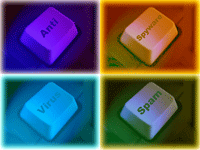The risks and consequences of poor online security
It is very difficult for people to assess the risks of being connected to the internet, especially now we have fast broadband connections, allowing files to be transferred at increasing bit rates.
Some of the main risks come from:
Viruses - thousands of new virus variants appear every month, therefore it is necessary to keep your anti-virus software up to date to prevent them.
Spyware – spyware is perhaps one of the greatest threats on the internet. 9 out of the computers are suspected to contain spyware. Spyware can infiltrate your machine in several ways, including through downloaded files, by clicking on pop-ups within sites and by visiting malicious websites. As with viruses, it is always prudent to keep your anti-spyware software current.
 Spam – spam is on the increase and it is now estimated that up to 90% of all emails can be identified as spam.
Spam – spam is on the increase and it is now estimated that up to 90% of all emails can be identified as spam.
Phishing – websites which pretend to be genuine in order to fool you into parting with your data or money are also on the increase.
Identity theft – whether through phising, spyware, keylogging or some other form of security breach.
Hacking – without an effective firewall you are leaving yourself wide open to hackers.
The consequences of poor security
Without proper security software you are making yourself vulnerable to hackers, viruses, spyware and phishing sites. This can result in several consequences to you and your system including:
1. System sluggishness and potential crashing.
2. Loss of internet connection.
3. Financial loss as a result of key-logging or other potential identity theft.
4. Hijacking and re-routing of your dial-up connection leading to increased phone bills.
5. Passing viruses onto friends and relatives.
6. Invasion of privacy.
7. Loss of data including personal files, photos and possibly anyone else’s files stored on your computer.
8. Your computer being used as part of a bot-net to spread email and malicious files to others on the internet.
What you can do
It is your responsibility to ensure that your computer is safe and secure against malware, hackers and viruses. You would never leave the front door to your house wide open for fear of burglars and the same must be said of your computer. Whenever you connect to the internet you have the potential of receiving or transmitting all manner of potentially hazardous data.
In order to make your computer more secure you should:
1. Make sure you have anti-virus and anti-spyware software which is kept up to date.
2. Make sure that windows firewall is turned on or that you are using a third party firewall such as one from Zone Alarm.
3. Try and restrict your internet access to only trusted and known websites.
4. Never open email attachments unless you know and trust the source.
5. Beware of phishing email scams that tempt you into providing your username and password or some other form of sensitive information.
6. Beware of credit card scams who ask to deposit large amounts of cash into your bank account in return for a cash reward. This is a well known and often perpetrated scam.
7. Beware of email scams from forgery ebay, paypal or other sites asking you to confirm your details.
8. Always read the small print in anything you download to prevent inadvertently downloading spyware as an ‘added extra’. Often this spyware is only adware and is used as a marketing tool in order to tempt you into buying some goods or services, but it can be an annoying distraction.
9. Be careful when using file sharing or peer to peer sites as it is difficult to be sure of what is contained within files you are downloading. Trojans or files ‘piggybacking’ on legitimate files can attempt to thwart your security software.
10. Use your main email address sparingly to prevent it being rendered useless to spam.
11. Get a free email address to register on forums, social networking sites, and other sites where you require an email to register. Hotmail, yahoo or google mail can provide you with a free webmail account which can be accessed from anywhere. You can use your main address for close friends and family. Create another address for work colleagues and use another one to register for websites, forums etc.
12. Beware of websites with extensive pop-ups, use windows pop-up blocker or download a more extensive third party one. Sometimes you may want to allow pop-ups from specific sites. If you are using internet explorer you can allow specific sites by going to Tools-> Internet Options-> Privacy Tab-> Settings under Pop-Up Blocker. A list of allowed sites will be shown with an option to add more in the space provided. Often anti-spyware comes with a more comprehensive pop-up blocker, which can be more effective - if you have one make sure it is switched on. Firefox, Safari and other browsers also contain pop-up blockers which are usually turned on by default.
13. Use anti-rootkit software to prevent rootkits being installed on your machine.
14. Above all, be aware while you are browsing the internet, and don’t assume anything.
